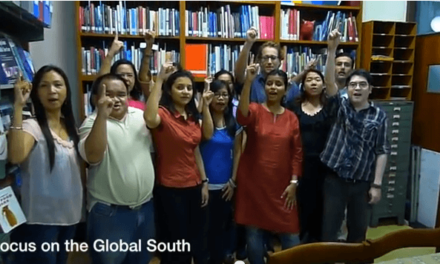By Walden Bello
One thing you can say about Ronald Reagan: he knew when to cut and run. When a suicide bomber took the lives of 241 US marines in Lebanon in 1983, he withdrew the US intervention force without batting an eyelash, keen to avoid what he and his advisers feared was a morass that could compromise the US strategically. His stubborn ideological successor at the White House could take a few lessons from him on when to retreat.
The Lebanon withdrawal, however, is the one positive element that this writer sees in the Reagan record.
His strategic policy was scary: to get Washington to achieve decisive nuclear superiority over the Soviet Union and prepare it for the possibility of a “limited nuclear war” with the Soviets. Détente was abandoned and the number of potential targets in the Soviet Union was raised from 25,000 to an astounding 50,000 sites by his nuclear war planners.
It was actually in the Third World, however, that Reagan waged war, and he did it with the gusto of a playground bully where and when he could get away with it. Early on, he invaded minuscule Grenada and ousted its left-leaning government, with his diplomats manufacturing a “request” for intervention from the little known Organization of Eastern Caribbean States (OECS). Also brazen in its violation of international law was his mining of Nicaragua’s harbors and his financing and arming of mercenaries—the “contras”—to try to bring down the Sandinista government in Nicaragua. Then there was the 1986 bombing of Tripoli and Benghazi—an effort to murder Muammar Khaddafy via the use of “surgical” airpower that, instead, ended up killing, the Libyan strongman’s daughter and scores of innocent Libyan civilians.
Upon news of Reagan’s election, the right wing in El Salvador celebrated with firecrackers. They were not to be disappointed. Neither was Ferdinand Marcos, to whom Reagan’s emissary George H.W. Bush offered the following toast in Manila in a 1981 visit: “We love you, sir…We love your adherence to democratic rights and processes.” It took tremendous pressure on the part of State Department pragmatists like then Undersecretary Michael Armacost to get Reagan to abandon Marcos during the People’s Power Uprising in 1986. But while giving in to political realities, Reagan made sure to ensconce his good friend Ferdinand comfortably in exile in Hawaii.
Reagan and his ideological partner Margaret Thatcher initiated the neoliberal free-market revolution that ended the post-war compromise between management and labor in the North and swept away development-oriented policies in the global South.
It is said that Reagan did not believe in income redistribution. He did, so long as it was in favor of the rich. In the North, anti-union policies, indiscriminate layoffs, tight budgets, and social security cuts gutted the income of the working masses. The statistics are telling: Between 1979 and 1989 in the US, the hourly wages of 80 per cent of the work force declined, with the wage of the typical (or median) worker falling by nearly 5 per cent in real terms. By the end of the Republican era in 1992, the bottom 60 per cent of the population had the lowest share, and the top 20 per cent the highest share, of total income ever recorded. And indeed, among the top 20 per cent, wealth gains were concentrated among the top one per cent, which captured 53 per cent of the total income growth among all families.
Reagan’s Treasury Department took advantage of third world countries’ massive indebtedness to US commercial banks to push them to adopt radical programs of trade liberalization, deregulation, and privatization that were administered by the International Monetary Fund (IMF) and the World Bank under the rubric of “structural adjustment.” For most of the developing world, the 1980’s came to be known as the “Lost Decade.”
In Latin America, owing to structural adjustment, the number of people living in poverty rose from 130 million in 1980 to 180 million by the beginning of the 1990s. In most countries, the burden of adjustment policies fell disproportionately on low-income and middle-income groups while the top five per cent of the population in most countries retained or increased its income share. By the beginning of the nineties, the top 20 per cent of the continent’s population was earning 20 times that earned by the poorest 20 per cent.
In Africa, structural adjustment was one of the key factors that led to an astonishing drop in per capita income by over two per cent per year in the 1980s, so that at the end of the decade, per capita income had plunged to its level at the time of independence in the 1960s and some 200 of the region’s 690 million people were classified as poor by the World Bank. Surveying the devastated landscape created by free-market programs, the World Bank’s chief economist for Africa admitted: “We did not think that the human costs of these programs could be so great, and the economic gains so slow in coming.”
Even key US allies in the Cold War felt the Reagan sting. Demanding more liberal terms for the entry of US goods and investments into the “Newly Industrializing Countries” (NICs) of East Asia, a Reagan subordinate warned: “Although the NICs may be regarded as tigers because they are strong, ferocious traders, the analogy has a darker side. Tigers live in the jungle and by the law of the jungle. They are a shrinking population.” Trade warfare was waged against South Korea, so that in the space of four years, the US’ massive trade deficit with that country was turned into a trade surplus. Washington also forced Tokyo to drastically raise the value of the yen relative to the dollar, to reduce imports from Japan and increase exports there; this was one of the factors that eventually led to that country’s long recession in the 1990s.
If I were asked what epitaph I would write for Ronald Reagan, it would be “Here lies a man who was good for the upper 20 per cent of his fellow Americans and his rich and powerful buddies elsewhere, but bad for the rest of us.”
Oh yes, Reagan gave this left-wing exile political asylum in the US in 1985, but that, I have been assured, was the result of a bureaucratic foul-up. But, thank you anyway, Mr. Reagan, and do rest in peace.
* Walden Bello is executive director of the Bangkok-based Focus on the Global South and professor of sociology and public administration at the University of the Philippines.








